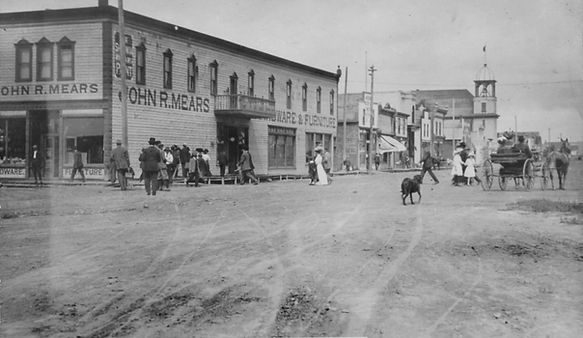
Our Roots: The History of
the Town of Arcola
Welcome to Arcola - a town built on deep roots, rich stories, and a strong sense of community. Long before settlers arrived, this land was part of the historic Fort Ellice–Wood Mountain Trail, used by First Nations, Métis traders, and later the North-West Mounted Police during their 1874 March West, a journey now memorialized by the Red Coat Trail that runs through our community.
In 1882, the first settlers arrived, and just two years later, W.H. Jones built the very first home on our townsite. By 1889, our post office opened its doors, and with the arrival of the Canadian Pacific Railway in the early 1900s, Arcola quickly became a bustling hub in the southeast. We officially became a village in 1901 and proudly earned our town status in 1903.
Our early years were marked by ambition and resilience, which can still be seen in the beautiful heritage buildings that line our streets. From the 1905 Town Hall (which once served as an opera house) to the grand Land Titles Building, Merchant’s Bank, and Brock Union Hospital, these landmarks remind us of the hard work and vision of those who came before us.
We are especially proud of moments like 1924, when local homesteader Isabelle Rogers Bryce became the first woman to win the grand championship at the Chicago International Livestock Exposition with her Clydesdale mare. Or the years when celebrated author Sinclair Ross lived and wrote here, capturing the spirit of prairie life in his classic novel As for Me and My House. In 1927, we unveiled our war memorial cenotaph - a lasting tribute to the brave men and women who served our country.
Even in more recent decades, Arcola has continued to thrive while honoring our past. In 1976, our town served as the filming location for Who Has Seen the Wind, chosen for its authentic prairie charm. When we lost our skating and curling rinks to a fire in 2001, we came together to build Prairie Place - a multi-use complex that now stands as a symbol of our determination and community pride.
We’ve celebrated milestones like our 100th anniversary in 2003, the Co‑op's centennial in 2016, and we launched Antique Ag Daze in 2014 to celebrate our agricultural heritage with blacksmithing demos, tractor parades, and more. Most recently, in 2023, we revitalized our cenotaph with the “Arcola Remembers” initiative, ensuring our veterans are honored not just in stone, but through stories, education, and remembrance.
Arcola isn’t just a place - it’s a living story, shaped by generations of resilience, pride, and community spirit. Whether you're passing through or planting roots, we welcome you to be part of it.

Step back in time and explore the rich history of the Town of Arcola through a collection of photographs that capture its evolution. From the early homesteaders breaking the prairie soil to the bustling harvest seasons, community gatherings, and modern-day celebrations, this gallery showcases the heart and spirit of Arcola. See how our landscapes, traditions, and people have shaped the town into the thriving community it is today. Every photo tells a story—come discover ours.






